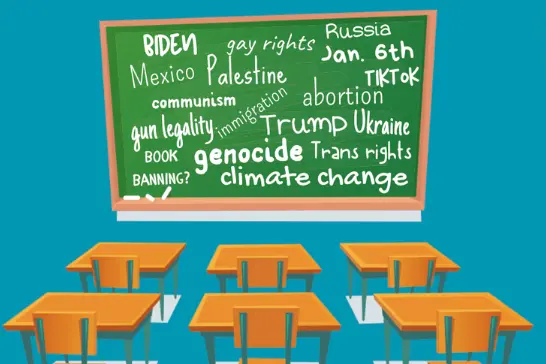Current Events in the Classroom: Yay or Nay?

With the advent of the 2024 general election, a buzz of anticipation hovers over the country. For many teenagers in America, this election is a milestone; the first presidential election where they can vote. The power of democracy finally is falling into their hands; but in such a polarized landscape with so much information, true or otherwise, at our fingertips, how does one decide what to think and who to vote for, especially in a century where many people find little use for newspapers outside of the crossword?
In a voluntary-response survey sent out to students at PHS, only 19% of respondents said they read newspapers as their primary source of news. Interestingly, many students don’t actively seek world news, and some admit that what they know has been gleaned from social media infographics and discussions in the classroom, and nothing more.
As such, the high school classroom is more than a place for learning, it’s also a space for exploring and sharing ideas, guided by knowledgeable teachers. Current events and world news are not part of the curriculum in PUSD schools, and whether teachers discuss current events is up to their discretion. One teacher rationalized that their students do not seek to be civically aware on their own and that what is discussed during the classroom is often the extent of their knowledge of politics and world affairs, a sentiment shared by many other teachers I spoke to. However well-intentioned these teachers may be, I wondered to what extent they put aside their personal biases in the classroom.
I couldn’t help wondering whether teachers should refrain from discussing current events in the classroom so as not to lean into their biases and opinions on politics in the classroom and potentially skew the minds of their students, which could, in turn, lead students to be even more ignorant. Is it better to have teenagers with a potentially biased political awareness or no awareness at all?
I was curious about what my peers thought about learning about politics and current events in school; whether they enjoyed it, whether they found it useful, what their primary source of news was, and whether they thought it was okay for their teachers to be openly biased about their beliefs in the classroom. Alongside several interviews with students and teachers, I set up a survey and received over one hundred voluntary responses from the students at PHS.
According to respondents, 66% of students said they had at least one teacher who discusses current events in class occasionally or frequently, and 49% of them said that their teachers’ political biases come through in these discussions.
“Many students aren’t learning about current events otherwise, and it creates a space for students and teachers to discuss current events with each other,” one student said. This case, akin to what a few teachers mentioned, intrigued me. Imagine a student who doesn’t know about current events; they may walk a substantial part of their life unaware of the power they have as a citizen of democracy. They may not know when to speak out about an issue they might care about, because they don’t know enough to care in the first place. A teacher who instills the importance of being aware of current events may have a lifelong effect on such a student and prevent ignorant mindsets from persisting among students when they leave high school. Additionally, one student added that “[they] believe it's contextual. It's useful to hear other people's political ideas and preferences, as long as they're being presented as such, as opposed to being preached as fact, and morally right,” proposing that oftentimes, students can sense when a teacher is taking a polarized stance on a discussion topic, in which case teacher bias is less of an issue to consider. “We are old enough to form our political views and are not easily influenced like a 5th grader.”
On the other hand, some students argue that they want to develop their political views without the influence of their teachers and that they shouldn’t stand in the way. “I think it is in poor taste for a teacher to incorporate their own opinion into discussion, the best thing a teacher can do is start a debate and play the other side of the argument with students,” one person noted. “Teachers hold a position of a lot of power over students, and it could very easily go [badly],” said another.
It is nearly impossible to prevent teacher bias from coming through to students when teaching without eliminating discussion of current events in the classroom. Students will be influenced by their peers and teachers no matter the circumstance. But not talking about what is going on in the world could lead to an ignorant generation of voters. So I’ll pose this question to you: Should teachers talk about current events in the classroom, knowing that there may be bias involved?

